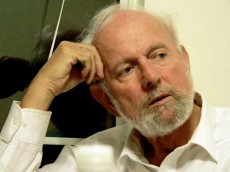Interview with environmental expert Ernst Ulrich von Weizsäcker
 The scholarship holders of the DAAD Masters program in Environmental Governance have invited one of the thought leaders in the area of sustainable development to their Freiburg conference: Professor Ernst Ulrich von Weizsäcker. The physicist and biologist served as director of the UNO Center for Science and Technology in New York and of the Institute for European Environmental Policy. He also helped establish the Wuppertal Institute for Climate, Environment and Energy as its co-founder. In his newest book “Factor Five”, von Weizsäcker presents a strong case for sustainable, environmentally-friendly business practices.
The scholarship holders of the DAAD Masters program in Environmental Governance have invited one of the thought leaders in the area of sustainable development to their Freiburg conference: Professor Ernst Ulrich von Weizsäcker. The physicist and biologist served as director of the UNO Center for Science and Technology in New York and of the Institute for European Environmental Policy. He also helped establish the Wuppertal Institute for Climate, Environment and Energy as its co-founder. In his newest book “Factor Five”, von Weizsäcker presents a strong case for sustainable, environmentally-friendly business practices.
The question up for discussion in Freiburg is how to achieve increased sustainability. Your answer to this question is to use resources more effectively which in turn leads to increased wealth creation. Does that really work?
Ernst Ulrich von Weizsäcker: From a mathematical standpoint, yes, it is possible. Global resource productivity can achieve a gain of at least 75 to 80 percent. Five times more wealth per kilowatt-hour can be extracted from areas responsible for the highest greenhouse gas – these include buildings, industry, agriculture and transportation. The problem is a matter a mindset as well as economic frameworks. Twenty years ago a car was developed in the USA that uses a mere 1.5 litres of fuel per 100 kilometres. That car never went into mass production. The real gas guzzlers did.
Why is that?
We live in a culture of wastefulness. Wastefulness is subsidized or at least made possible economically. The US is the leader in squander and the rest of the world’s nations are following suit. We Europeans are doing a better job but we’re still not doing enough.
How can people be convinced that sustainability is the way to go?
It’s tough. Both society and our economic system are based on envy and egotism; a system like this needs continual growth. Any gains in efficiency are fed straight back into growth. This is what we call the “rebound” or “boomerang” effect. Just because technological advancements help reduce the fuel consumption of a midsize automobile does not automatically lead to decrease in fuel use. Instead, the car owner uses this money to either travel more or buy another vehicle.
What’s your solution?
In my opinion, there’s only one way: Energy prices and resource consumption prices must be raised in line with efficiency gains. This where governments need to step in, because over the past 200 years the market has made it increasingly cheaper to consume our natural resources, even as they continue to dwindle. If people knew that the price for energy and resources are to go up, most of them would automatically begin to focus on efficiency and savings. They’d use their cars only in cases when the benefits of doing so far surpass the bus or bike option.
So it’s back to a more modest way of living?
Modesty is a good virtue to have, but it’s a long-shot for most people. What we need is a good mix of efficiency and sufficiency. Sending a signal with gentle price increases is the right way to go about it. We’d be able to decrease our environmental footprint while leaving our level of well-being intact. Throw-away society and maximization of profit have very little to do with well-being. A house that runs on practically no energy at all, or game of Skat or a house concert that is possible without having to travel to Tenerife – this is the stuff a higher quality of life is made of.





